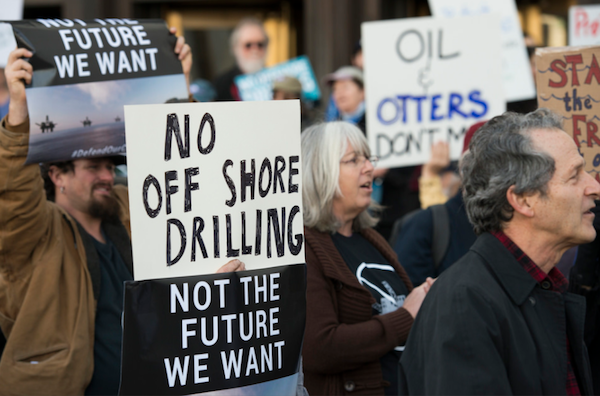
With tourism, fishing and recreation vital to coastal economies, Newport and Toledo leaders vote to protect Oregon's coast
Newport, OR – Last week, the Port of Toledo took leadership passing a resolution opposing offshore oil and gas drilling and exploration off Oregon’s coast, spurring leaders within the Port of Newport and City of Newport to draft similar resolutions for adoption in the coming week. They are responding to a federal proposal released in January that would open 90 percent of US waters to oil and gas drilling. No new oil leases have been offered offshore from Oregon, Washington or California since 1984, but this plan calls for seven along the Pacific coast. The proposal has met with immediate, bipartisan opposition, with state leaders around the country urging the Trump administration to protect the millions of jobs and businesses that rely on a healthy ocean. The City of Newport will join 160 municipalities on both coasts in opposing the federal proposal.
 Hundreds gathered in early February at the State Capitol to oppose oil drilling proposal. Now cities, ports and other municipalities make formal their opposition with resolutions and letters directly to BOEM.
Hundreds gathered in early February at the State Capitol to oppose oil drilling proposal. Now cities, ports and other municipalities make formal their opposition with resolutions and letters directly to BOEM.
On Feb. 6, nearly 300 Oregonians from all over the state representing business, fishing, and conservation interests gathered in Salem to attend the Bureau of Ocean Energy Management’s (BOEM) informational meeting in Oregon. BOEM is holding one meeting per state, and none allow public testimony. Denied the opportunity to speak at the meeting, elected officials, Tribal, fishing and conservation leaders took to the steps of the Capitol for a rally and press conference, where they stated their opposition to the federal offshore drilling plan, citing their concerns about the risks to Oregon’s economy and environment.
“Oregon’s public ports are a significant source of jobs, wages, and economic activity for our state, and the Port of Toledo is no exception,” said Bud Shoemake, Port Manager of the Port of Toledo. “We have a strong tradition of supporting local maritime businesses and providing recreational opportunities for residents and visitors. Offshore drilling on Oregon’s coasts presents a serious threat to these activities and the way of life we’ve built in this region.”
 Port of Newport Commissioners listen to testimony supporting a resolution in opposition of offshore drilling
Port of Newport Commissioners listen to testimony supporting a resolution in opposition of offshore drilling
A healthy ocean is a major economic engine for Oregon’s coastal communities. Beyond the many fishing-related jobs, this includes small business owners who operate bed and breakfasts, restaurants, whale watching charters, and rentals for recreational equipment such as kayaks, surfboards, diving equipment, among others. A 2011 study by NaturalEquity, Surfrider, and Ecotrust found that coastal recreation alone generates $2.4 billion per year.
“This is the future of our coast and we commend the Port of Toledo and leaders within Lincoln County for their strong leadership and response to BOEM,” said Charlie Plybon, Oregon’s Policy Manager for Surfrider Foundation. “We hope that other Oregon communities, ports, and public entities will follow their lead in protecting our coastal economy and way of life by opposing offshore oil drilling and exploration.”
BOEM is accepting public comments on the 2019-2024 “Draft Proposed Program” for offshore drilling online through March 9. After the comments are received and environmental reviews conducted, the “Proposed Program” will be released, triggering another comment period. The “Final Proposed Program” is expected by 2019. The current plan includes seven lease sales on the Pacific Coast: one for Oregon and Washington, and six in California.
